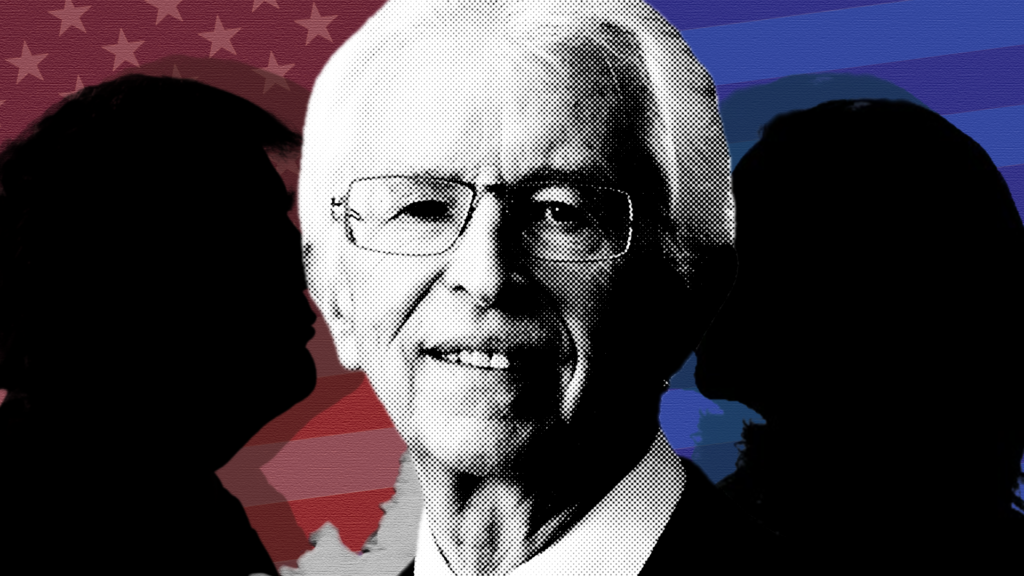Question for the candidates: Has Russia’s war in Ukraine changed your view of the role of nuclear weapons?
By Siegfried S. Hecker | September 19, 2024

Editor’s note: Former Los Alamos lab director Siegfried Hecker proposes a series of nine questions on great power competition, the global nuclear order, proliferation, and the role of nuclear energy that journalists and citizens should ask the 2024 presidential candidates. (This is part of an “experts comment” series of questions for the candidates.)
Great power competition
Background: The threat posed by nuclear weapons during the past eight years is greater than at any time since the end of the cold war. Russia has fielded nuclear weapons with new capabilities and has threatened to use non-strategic nuclear weapons to achieve its goals in the brutal, unjustified invasion of Ukraine. China has abandoned its decades-long policy of minimal nuclear deterrence, apparently to achieve nuclear parity with the United States. This has been accentuated by China’s lack of transparency and unwillingness to engage in nuclear dialogue. Both the Trump and Biden administrations have forged a more muscular US nuclear weapons policy and committed to major modernization of its nuclear arsenal and nuclear complex.
Questions for the candidates:
- How has Russia’s war in Ukraine changed your view of the role of nuclear weapons in Europe and by extension to Northeast Asia?
- How does China’s nuclear buildup shape your view of the requirements for the US nuclear arsenal and for nuclear policy?
North Korea
North Korea has continued its determined march to field a threatening nuclear arsenal. During the Trump administration, it added 20 to 25 nuclear weapons to its arsenal, along with demonstrating intercontinental ballistic missiles (ICBMs) and testing a hydrogen bomb. During the Biden administration, it continued its pace of adding perhaps as many as seven nuclear weapons per year. It increased the sophistication and variety of its arsenal to include solid-motor ICBMs and tactical nuclear weapons. Kim Jong-un ended the North’s 30-year policy to pursue normalization with Washington, instead linking up tightly with Russia and possibly China. Kim also abandoned peaceful unification with South Korea and expanded the role of nuclear weapons from deterrence to include other existential threats to North Korea.
In addition, North Korea is poised to advance its arsenal to become only the third country in the world, after Russia and China, to threaten the continental United States with nuclear weapons.
- Should North Korea use this nuclear threat to attack South Korea, perhaps to enforce what it sees as its legitimate borders, what will you be prepared to do to either prevent or respond?
- And how would you respond to a South Korean decision to field its own nuclear arsenal?
India and Pakistan
Since India and Pakistan declared themselves to be nuclear powers with a series of nuclear tests in 1998, for the most part Washington has turned a blind eye to Pakistan’s growing nuclear ambitions. Likewise, it sat on the fence while India built its arsenal, until the Bush administration accepted India as a de facto nuclear weapon state in 2005. In recent years, both countries have increased the number and sophistication of their arsenals determined to be able to field all three legs of a nuclear triad. Interstate rivalry continues while Pakistan domestic politics continues to mire it in chaos.
- How will you address the increasing, but largely ignored, nuclear dangers in South Asia?
Iran
Since President Donald Trump withdrew US participation from the Joint Comprehensive Plan of Action (JCPOA) with Iran in 2018, Tehran has moved ever closer to be able to field a nuclear weapon. Israel has since revealed intelligence evidence that Tehran had a robust nuclear weapon design effort by the late 1990s and apparently continued a covert effort in that direction even while in the JCPOA, making Iran a threshold nuclear weapons state.
- How would you respond to Iran’s continued nuclear buildup, which has considerably reduced the breakout time required for nuclear weapons, especially considering the escalating dangers resulting from the war in Gaza?
- What would you do to dissuade Saudi Arabia’s crown prince from responding to Iran with his own nuclear weapons program?
The global nuclear order
The current nuclear dangers appear to be eclipsing what has been a relatively positive nuclear order developing for decades—with no nuclear weapon used since 1945, proliferation kept to less than 10 states, no nuclear terrorism, no mushroom cloud, no dirty bomb, and significant clean energy from nuclear power and positive contributions from nuclear medicine and industry. That entire order has been badly, if not fatally, fractured by Russia’s invasion of Ukraine started in February 2022.
How would you attempt to restore the global nuclear order absent a fair termination of the war in Ukraine? Would you be willing to take the political risk of inviting China to join the United States to do so? If you do, how would you get China to the negotiating table?
At the same time, most non-nuclear weapons states joined efforts to pass the Treaty on the Prohibition of Nuclear Weapons (TPNW) in 2017, largely in frustration over what they consider to be lack of progress on Article VI of the Treaty on the Non-Proliferation of Nuclear Weapons (NPT), which spells out disarmament-related obligations but that Washington has elected not to sign.
- How would you address the concerns over lack of progress on nuclear disarmament?
Nuclear energy
At the December 2023 UN climate summit (COP28) in Dubai, more than 20 countries—including the United States—pledged to triple nuclear energy capacity by 2050, largely to help achieve global net-zero greenhouse gas emissions. President Biden supports that goal. Yet, the US nuclear industry has become non-competitive, making the pledge only an aspirational one: It has commissioned only five reactors in the past 30 years—the two new ones at the Vogtle plant in Georgia were years behind schedule and cost more than twice the original estimate. The current move to small modular reactors looks promising, but the nuclear industry must demonstrate that these can help to revive the industry.
- Do you support the goal of tripling nuclear energy by 2050 and, if you do, what should the next administration do to make the US nuclear industry more competitive?
Has Russia’s war in Ukraine changed your view of the role of nuclear weapons? By Siegfried S. Hecker
What will you do to avoid a nuclear arms race with Russia and China? By Steven Pifer
What is your plan to prevent the next dangerous and expensive nuclear arms race? By Laura Grego
How many nuclear warheads does the United States need? By Tom Z. Collina
Should the president retain the sole authority to order the use of nuclear weapons? By Mackenzie Knight
Do you agree with other world leaders that the use of—or threat to use—nuclear weapons is “inadmissible”? By Daryl G. Kimball
How will you reassure allies worried about the credibility of the US security guarantees? By Sara Bjerg Moller
What will you do if Iran gets the bomb? By Henry Sokolski
How will you deter North Korea’s aggression without deteriorating the situation on the Korean Peninsula? By Eliana Johns
Will the United States sign and ratify the Treaty on the Prohibition of Nuclear Weapons? By Alicia Sanders-Zakre
Together, we make the world safer.
The Bulletin elevates expert voices above the noise. But as an independent nonprofit organization, our operations depend on the support of readers like you. Help us continue to deliver quality journalism that holds leaders accountable. Your support of our work at any level is important. In return, we promise our coverage will be understandable, influential, vigilant, solution-oriented, and fair-minded. Together we can make a difference.
Keywords: 2024 presidential election, United States, candidate questions 2024
Topics: Nuclear Weapons















